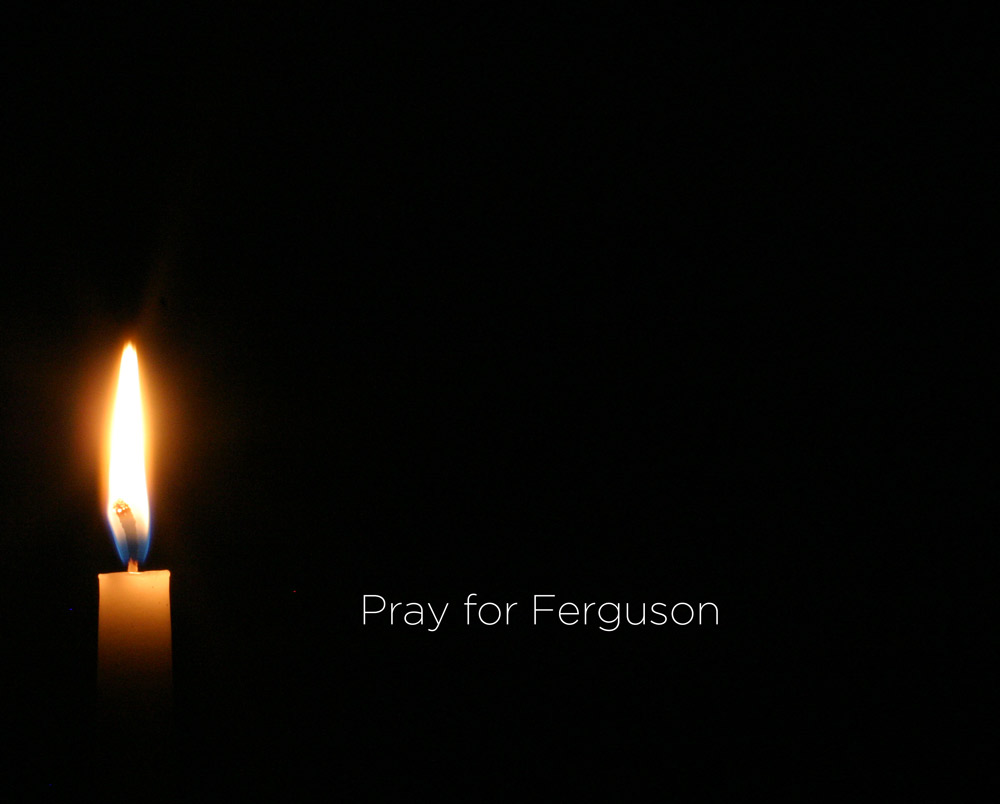Michael Brown
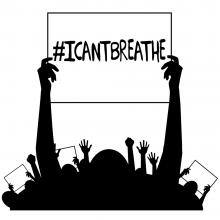
Our nation stands at a crossroads moment as the simmering crisis around policing and our justice system reaches a boiling point. Recent cases of police violence in Ferguson, Cleveland, and now Staten Island have stirred an awakening around what is increasingly understood as a pervasive and pernicious problem in America in which black lives are too often treated differently when it comes to police accountability and criminal justice.
Last week, I had the privilege of participating in a retreat with other faith leaders convened by Sojourners to learn about and make common cause with the ongoing efforts to seek justice in the tragic death of Michael Brown Jr. We spent a day talking to local faith leaders and young activists. We visited the memorial site in Ferguson where Brown was tragically killed and the streets where 120-plus days of protest have ensued. While it was heart-wrenching to stand and pray at the site where Brown was killed, I left the two days filled with a resilient sense of hope based on our conversations and interactions with a cross section of young people, most in their early to mid-20s, who embody modern-day freedom fighters. I hope we as a nation can listen to their voices and come to know their stories as we seek answers around what our response should be.
Young activists at the center of the protest movement in Ferguson are refusing to accept cosmetic change or symbolic commitments; instead they are fighting to transform their community and our nation so that neither punishment nor privilege will be systemically or viciously tied to the color of our skin. In the process, these young activists are picking up the broken pieces of the civil rights struggle. Their courage, willingness to sacrifice, and bold vision gave me a great deal of hope for what America can be.
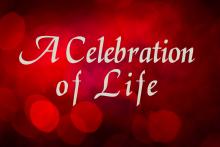
For the past several years, I have been less outwardly celebratory during the Christmas season. No wreaths, trees, or bad sweaters for me; I have chosen to be introspective during the end of the year season in order to keep my focus on the true meaning of Christmas. This has become increasingly difficult, as the process of commercializing the celebration of Christ’s birth begins right after Halloween and extends itself until after the nation celebrates the life of Dr. King in January. This year, it has been increasingly difficult to concentrate on this Season of Advent in light of all of the anger and protests going on around the country. The protests over grand jury decisions in both the Michael Brown (Missouri) and Eric Garner (New York) cases and the heartbreak and anger over the deaths of Tamir Rice (Ohio) and Akai Gurley (also in New York) have served for me as a reminder that we need to rally around life.
Many of those critical of the decisions in these cases say that black lives do not matter, and there is some validity to that in a nation that has never truly been delivered and healed from the effects of chattel slavery. Those on the other side say that these cases have gone to the judicial system and that the system should be respected, the issue dropped, and that personal responsibility is the mindset that will move the nation forward. While there is truth in both of those opinions, I am led to think of the joy the families of these dead men and boys must have felt at their birth – a moment of endless possibilities – and I also think of the finality – the end of chances represented by their deaths.
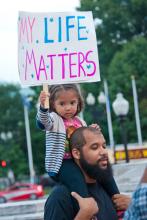
There is power in a name.
One of the things happening in our world right now is that people are “naming” injustice. No longer are we just talking about statistics, numbers and data. We are lifting up the names of the victims of a failed justice system. And there is something in a name that humanizes and personalizes the issue, and wakes us up: Trayvon Martin, Michael Brown, Eric Garner, Tamir Rice.
The numbers have names.
They remind us of the collateral damage of a failed system, and the urgency of this moment. We can’t make injustice history until we make injustice personal.
For many people of color, the victims of injustice have had names for a long time. Emmett Till helps us know how far we have come; Eric Garner reminds us how far we still have to go. But now these names are being talked about in homes and around dinner tables all over the world.
Every name of a life lost is an image of God. When we lost them, we lost a little piece of God’s image in the world. They are friends, sons, sisters, fathers and neighbors.
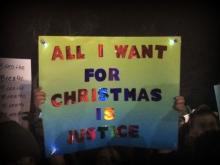
As I followed protesters along the National Mall after the non-indictment of New York City police officer Daniel Pantaleo, I was particularly struck by the comments of one black gentleman named Houston. Putting down a sign that said “Boycott Christmas,” he took a speaker, called for quiet, and, in the midst of the crowd, began to preach:
“We must move on to that new day in which justice will roll down like water, and righteousness like a mighty stream. It is time for black and whites to take hand and hand and move this nation beyond the pitiful historical dilemma … So black and white together, we must move on to where even the stones will shout out, ‘It’s time for America to be one.’”
“Amen,” someone shouted.
Amen, indeed.
Drawing on Amos 5:24 and Luke 19:40, Houston had brought the riches of a deep biblical tradition to bear on our contemporary political struggle. Like the early Christians, he called not only for justice but also for reconciliation between races. His faith had inspired him to act.
Or so I thought.
St. Louis County Prosecuting Attorney Robert McCulloch stood at the podium three nights before Thanksgiving and announced the St. Louis grand jury would not indict police officer Darren Wilson in the shooting death of unarmed 18-year-old Michael Brown in Ferguson, Mo. Moments after the announcement, Ferguson exploded in protests, then rage, then flames. Spontaneous protests also broke out in cities and towns across the country and carried on through the Thanksgiving holiday.
The morning after the announcement I received an email from friend and colleague David Bailey, who shared this song, “Don’t Shoot.” It was written and performed by students at Berklee College of Music, who go by the name Fleeceboi. They were so grieved by the announcement that they stayed up all night writing the song. I listened and wept.

The three of us put our cups of coffee on the counter and reached into our pockets for our wallets. The check-out clerk paid no attention to any of us. He seemed to be staring at someone or something in the back of the store.
“We’re ready to pay,” one of us said.
The clerk kept looking at the back of the store. A few seconds went by before he told us what had his attention.
“I’m watching that boy over there to make sure he don’t steal nothing,” the clerk said.
The three of us looked at the back of the store and realized the clerk was talking about our co-worker.
Four of us were carpooling across Florida on a work assignment several years ago. It took several hours to cross the state. We stopped at a place called Yeehaw Junction off Route 60 to use the restroom and get some coffee.
The three of us at the check-out counter were white, like the clerk. The co-worker accompanying us was black. The clerk assumed that because the three of us were white, we would understand and agree with his attitudes and assumptions about our co-worker – that he was dishonest because of the color of his skin. Needed to be watched. Couldn’t be trusted. Too dangerous to let out of his sight.
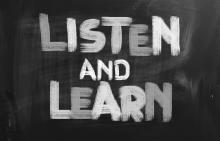
A few days ago, a friend of mine commented on a picture I posted on Facebook. It captured one of those rare moments in the daily grind of stay-at-home parenting where — in the midst of the diaper changes, meltdowns, and mealtime madness — there is a moment of pure delight. In this case, my two sons were sitting together for the first time in the front of a race car-themed shopping cart. My 3-year-old son was thrilled to have his infant brother “driving” with him. I couldn’t resist snapping a photo and posting it immediately. Having two sons of his own, my friend commented, “2 boys! What a great idea!”
I thought of this comment last Monday night when I heard the painful news of the grand jury’s decision in the Michael Brown case, and later when I heard of the same conclusion in the Eric Garner case. Yes, it was a great idea to have boys. My husband and I love them more than anything. They’ve brought more joy into our lives than we could ever have imagined. But, I wondered, how different would our experience be if we were parents of black sons instead of white sons? How much more worry and heartache would we face knowing the cards were stacked against them from birth? What would it be like to have to figure out how and when to have the talk — the one about law enforcement, no second chances and the need to go above and beyond in every situation?
I wasn’t always aware of the vastly different realities for people of color living in this country. My conversion was slow. Not the Damascus Road type of experience where I was blind for three days and then instantly I could see. No, it was and continues to be a long, slow, sometimes painful process of listening and learning.
Protests have again erupted across the United States following the Staten Island grand jury’s decision not to indict Daniel Pantaleo for the choking and killing of Eric Garner. Building off the online mobilizing network established in response to Ferguson, the most recent wave of community actions have gathered support via social media. After events are posted on Facebook or Tumblr, or simply spread through word of mouth, Twitter hashtags provide real-time updates that direct potential supporters to the location of a march.
In Washington, D.C., protests began outside the Department of Justice at 4:00 p.m. and continued throughout the city late into the night — through the National Mall, near the White House, the D.C. police department, and city hall. Comprising many races and many ages, crowds chanted phrases like, “Black lives matter” and “This is what democracy looks like.” One black mother, Shantelle, who was pushing her toddler in a stroller, explained why she was out marching today:
“We’re proud to be American. We’re military. We love our country. But we keep getting it, my son is gonna’ keep getting it. We’re not valued and we’re not looked at. I want him to grow up in a place where he doesn’t have to worry he wore the wrong hoodie, or he was playing with a toy gun, or he gets a chokehold, and dies.”
Another, older woman simply said, “I’m old. I hate that I have to be out here. I’m sick of doin’ the same old stuff.”

Bill Hybels, Senior Pastor for Willow Creek Community Church, spoke out last week on the ongoing Ferguson protests. In the video, shared this week by Willow Creek Church-affiliated artist group The Tungsten Collective, Hybels calls on people of faith to listen to the pain and hurt expressed by many since the August shooting of Michael Brown.
He quotes James 1:19, urging people of faith to “be quick to listen, slow to speak.”
Hybels has spoken out on racial reconciliation for years, and here underscores one reason why reconciliation work is often so difficult.
“It’s just so much easier to live in your own story than it is to try to understand the narrative of the other,” Hybels said.
Indeed, when it comes to interactions with law enforcement, the black experience and the white experience in America are “two totally different narratives [that often] … don’t touch each other until a Ferguson happens,” he said.
At one point the megachurch pastor emphasizes — almost uncomfortably lightheartedly — just how untouched he’s been by fear, crime, and violence in his neighborhood.
“[Peace] is all I’ve ever known. I’ve never had a single adversarial experience with a law enforcement officer in my entire life,” he said.
But in drawing a distinction in the difference of experience, he echoes a Jia Tolentino column in TIME earlier this fall on how social divisions are revealed based on which evils we mourn and pledge to fight against. While Hybels falls short of explicitly naming a power and privilege differential, he urges humility, listening, and seeking understanding among people of faith — all the more resonant today after the non-indictment ruling on the choking death of Eric Garner.
WATCH the full video here.
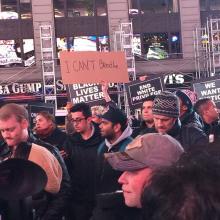
I was in Ferguson Wednesday when it happened: In a morally stunning decision, a Staten Island grand jury announced it would not bring criminal charges against a white police officer who choked a black man to death during a brutal incident last July. Stopped for allegedly selling some loose and therefore untaxed cigarettes, officer Daniel Pantaleo put a “chokehold” on Eric Garner, despite the fact that the move is against NYPD rules. Video of the incident shows Garner uttering his last words, “I can’t breathe.” New York’s medical examiner officially called this a “homicide,” but the grand jury said no charges will be made.
Of course, this comes just 10 days after the Ferguson grand jury decision not to indict another white police officer, Darren Wilson, for fatally shooting an unarmed black teenager named Michael Brown on Aug. 9. Sojourners had convened a retreat in Ferguson for both national faith leaders and local pastors to look deeply at the historical and theological foundations of the Ferguson events and reflect upon how the church must respond. Emotional calls from pastors in New York City came with the horrible news, and people just began to weep — one young man wailing, “This time it was all on video …. and it still didn’t matter! How can I as a black man bring a black son into this world?” Lament and prayers followed with a resolve from an extraordinary two days on the ground in Ferguson — to act.
Local experts in St. Louis County helped us understand the damage done to their local communities for decades that led to the response that erupted after the killing of Michael Brown. We walked silently and prayerfully alongside the memorial to the slain teenager on West Canfield Avenue with black parents imagining their own sons lying there, and white parents realizing this would never happen to our kids. We kept looking at the street where this bloody incident had taken place, feeling more and more doubt about the narratives the county prosecutor had used to exonerate and excuse the white police officer from any responsibility — or at least a trial to publically sort out “conflicting testimonies.”
We met in a church with seven young leaders of the Ferguson protest movement. In just 116 days, these young people had become self-educated and extraordinary leaders, and we listened to a compelling analysis of their urgent situation and how they were trying to apply the history of social movements to change their oppressive circumstances. Their chilling stories of police harassment and brutality, preceded by a narrative of the educational and economic brutality that black young people like them experience daily were transforming words for those of us who listened, spellbound. As I listened, I realized America would be converted by these young people’s honest and earnest conversation — they would win the national debate about our criminal justice system’s response to young people of color.

There’s this microaggression happening online, offline, and all around that has a nice sentiment, but really needs to stop. Can we call for a week-long moratorium on decrying “ALL LIVES MATTER?”
This is a request specifically for my white brothers and sisters, especially those in the church.
I, of course, as a white heterosexual married middle-class highly educated American male, believe that all lives matter. It’s something I’ve been fighting for my entire adult life. Whether it is the mother infected with HIV by her wayward husband in western Africa, whether it is the undocumented immigrant father who may be separated from his American-born children, whether it is the NRA card-carrying white uncle who does an honest job and is a good neighbor back in the midwest, whether it is the homeless thirty-something woman coming off a bad meth addiction but needing shelter during a difficult winter, of course, by all means, every life matters.
Your life matters. My life matters. All lives matter.
This is a non-negotiable. This is true. This is what it means to be made in the image of God, as we’re told in the Book of Genesis — everyone, whether you’re white, black, brown, male, female, straight, gay, bisexual, transgender, Republican, Democrat, rich, poor, nice, kind of a jerk, young, old, middle-aged, we all matter.
But these past couple weeks — these past four months, five months, 22 months? — it’s important that we stand with the ever-growing chorus and declare, yes, black lives matter. With the heartbreaking, soul-wrenching death of Michael Brown, the news just yesterday of another non-indictment in the death Eric Garner, or the dark night when Trayvon Martin was shot down in Florida, a chorus of voices has risen to declare with one voice and hashtag that #BLACKLIVESMATTER.

Just over one week after a grand jury elected not to indict Darren Wilson for the killing of Michael Brown, a Staten Island grand jury has cleared an NYPD police officer of any criminal charge in the death of Eric Garner.
The officer, Daniel Pantaleo, a white male, choked Mr. Garner to death as other police officers stomped on his head. Mr. Garner, 43, suffered from asthma and was suspected of illegally selling cigarettes.Along with other evidence, the grand jury viewed a video recorded by bystanders, which fully captured the violent arrest.
Editor’s Note: On Monday night, it was announced that a grand jury in St. Louis County found no probable cause to indict Ferguson, Mo., police officer Darren Wilson on any of five possible counts. Throughout the country, protests have erupted. For this week’s edition of the Weekly Wrap, we wanted to offer you the 10 most important things you should see, read, digest to understand the situation. We pray for peace.
1. Letter From Birmingham Jail
by Martin Luther King Jr. Far more relevant than it should be. Print it out. Write on it. Pray through it. "In the midst of blatant injustices inflicted upon the Negro, I have watched white churchmen stand on the sideline and mouth pious irrelevancies and sanctimonious trivialities."
2. PHOTOS: Scenes From Ferguson — and Beyond
Slate compiled these chilling shots from protests in Ferguson, New York City, Los Angeles, Washington, D.C., and more.
3. A Sad Night for America
“It is time to right the unacceptable wrong of black lives being worth less than white lives in our criminal justice system." our criminal justice system."
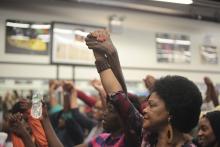
We must engage in courageous conversations. We need to have them in and amongst our own people—our families and our children, our close friends and allies, and in our racial/ethnic groups. A caucus can be an important thing. Make space for the asking of deep questions and the sharing of even awkward sentiments. Why is this happening? What does it mean? How does it affect my soul? Aren’t we past race yet, and can I do anything about this? How does my faith in God relate to these issues? How can I be a healer?
And we must have these conversations across what might seem to be natural divides. We need to have cross-racial/cross ethnic conversations. In order to do this, we must have relationships. We can’t liberate each other while we are in silos. Multiracial/multiethnic congregations like Middle Collegiate Church are critical to the work of racial reconciliation. If your church is diverse, think of ways to encourage deeper relationships. In our context, we have an ongoing small group called Erasing Racism, in which we are having critical conversations about race. If your context is mono-cultural, find a partner with whom to relate. Create a joint worship celebration or prayer vigil during Advent and have conversation as you break bread. Use questions like: When was the first time I was othered due to my personhood? When have I othered someone else? How can these experiences plant seeds for empathy? How did I learn the story of race and what can I do to change it?

Are you feeling pressure to be thankful?
We are in the midst of the Thanksgiving season. I’m reminded everywhere I go to “Be thankful!”
Well, call me the Scrooge of Thanksgiving, but I’m just not feeling thankful. The more someone tells me to “Be thankful!” the more I feel a sense of despair.
Be thankful? In the midst of Ferguson, Mo.? Jim Wallis writes that, “Many black families woke up this morning knowing that the lives of their children are worth less than the lives of white children in America.” And what will white America do about it? Nothing new. One side will continue the status quo of racism by denying that it even exists and then they will blame the victims. I firmly stand in the other side that blames America’s deeply embedded structures of racism, economic injustice, and educational inequality. To make matters worse, America is sharply divided over the shooting in Ferguson. Each side of the division blames the other for tragic violence. Sunday’s heated debate on Meet the Press between former New York Mayor Rudy Giuliani and Georgetown Professor Michael Eric Dyson is indicative of the deep racial tensions underlying not only Ferguson, but every city in the United States.
My Facebook news feed and the media are telling me how I’m supposed to feel about Ferguson. Outraged. Hurt. Anxious. Guilt. Anger. Bitter. But certainly not thankful.

The shooting of Michael Brown and the failure of a grand jury to indict the shooter, Darren Wilson, are symptoms of a wider malaise.
It is part of a deep-seated illness that infects our body politic: racism.
The sad reality is that so many people believe we live in a post-racial society because we have a black president. We cannot address the issue, challenge ourselves and transform our societies without a prophetic voice. Ferguson is the space where I see that voice re-emerging into America’s consciousness.
Racism is not just about individual acts. It is about a system that allows unarmed black boys to be shot at a rate 20 times that of white boys; it allows a prosecutor to deliver a speech as a defense attorney for the accused after he fails to get an indictment. It is a system that has a black president telling people to calm down as the police, in military gear, attack them.
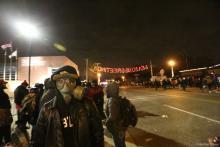
Many black families woke up this morning knowing that the lives of their children are worth less than the lives of white children in America. The deep distrust of law enforcement in their own communities that so many African Americans feel just got deeper last night — 108 days since the killing of unarmed teenager Michael Brown — when the prosecuting attorney announced the decision not to subject the police officer who killed Brown to a trial where all the facts could be publically known and examined.
We now all have the chance to examine the evidence — released last night — in the grand jury’s decision not to indict white police officer Darren Wilson, who fired multiple bullets into Michael Brown. But the verdict on America’s criminal justice system is already in for many Americans: guilty, for treating young black men differently than young white men.
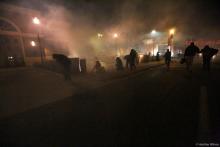
In a blog I wrote less than two weeks ago, “Justice ... not ‘Just Us’,” I asserted, “Our lives are constituted by relationships. The question is, ‘what is the nature of these relationships?’” I also asserted, “Exploitative relationships result in situations of ‘just us’ rather than justice.”
As I sat listening to Robert P. McCulloch, the St. Louis County prosecutor, return the grand jury’s decision to not indict Officer Darren Wilson for the fatal shooting of “Mr. Brown,” I kept waiting to hear comments regarding how or why Wilson was justified in firing several shots at an unarmed teenager.
After spending several minutes complaining about the news coverage and the use of social media, the county prosecutor began detailing the inconsistency of eyewitness testimony and the reliability of “physical and scientific evidence.” It was obvious at the outset that the prosecutor was setting the stage for the grand jury’s verdict by discrediting any and all witness accounts that suggested Michael Brown was surrendering or had his hands up before Wilson shot him several times.
While I was not surprised by the grand jury’s verdict, what I found disappointing in this case and continue to find disappointing in cases like this one, is the failure to discuss the use of “excessive force” by police. While giving his prepared remarks, McCulloch made no comments regarding Wilson’s use of deadly force against an unarmed 18-year-old man.
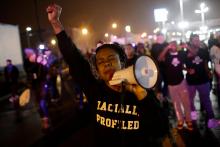
A grand jury has found that no probable cause exists to indict Darren Wilson, the Ferguson, Mo., police officer who shot and killed 18-year-old Michael Brown, on Aug. 9, said St. Louis County Prosecuting Attorney Robert P. McCulloch on Monday evening.
McCulloch said the grand jury was instructed on the law and presented on five possible indictments. He emphasized that the jurors "are the only people who have heard and examined every witness and every piece of evidence."
Protests throughout the St. Louis metro area — as well as nearly 100 cities across the country — are planned in response to the decision. Last week, Missouri Gov. Jay Nixon declared a preemptive state of emergency and activated the National Guard to respond to “any period of unrest that might occur following the grand jury’s decision concerning the investigation into the death of Michael Brown.” Rev. Traci Blackmon, a clergy leader in the St. Louis area, recently told Sojourners that while the city and county police departments have amassed weapons and riot gear to react to the protests, local community leaders and faith groups have been stocking up on bandages and first-aid materials.
Earlier in the day Brown’s family asked for 4.5 minutes of silence this evening before protests begin — a statement on the 4.5 hours Michael Brown’s body was left in a Ferguson street following the shooting.
The Justice Department is conducting its own federal investigation, however recent reports have indicated that it is not likely to result in civil rights charges against Wilson.
Stay tuned to Sojourners for continued updates and analysis.
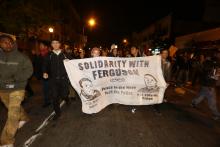
In an intimate conversation between Jesus and his disciples, just before Jesus predicts that Peter will deny him three times, Jesus asks Peter, “Will you lay down your life for me?” As Jesus’ crucifixion approaches, his question to Peter becomes reality, and the people who know of Jesus or his movement must make a choice — to suffer and die with Jesus, or to slip away in fear and passivity — to welcome Christ, or to reject Christ.
Peter is certainly not the only one to face this decision. Judas must choose to betray Christ or not; the high priests must choose between power and mercy; Pilate must choose the approval of the people or trust his own conscience. These individuals, however, do not stand alone in their decision-making, but among one of the strongest but often overlooked characters in Scripture — the crowd. As Jesus stands before Pilate, it is not Pilate who truly holds power — it is the raging crowd before him that demands for the freedom of Barabbas and the crucifixion of Jesus.
When looking back on the crowd’s decision, it is easy to see how wrong it was until we begin to ask where we stand among the crowd in our time. In the case of Ferguson and the grand jury’s decision on Darren Wilson, most of us stand in the crowd, waiting to see what the grand jury and the state may do while we decide what we must do. All eyes are on the jury, yet many of us who are watching realize that the real power does not reside in Gov. Jay Nixon or the grand jury, but in us. Just as it is the crowd who sways Pilate to crucify Jesus, so it is we who can determine whether justice comes in Ferguson and everywhere where racism exists. As bell hooks writes, “Whether or not any of us become racists is a choice we make. And we are called to choose again and again where we stand on the issue of racism in different moments of our lives.” Today, we have another choice. The grand jury is under the spotlight, but we are all responsible.
